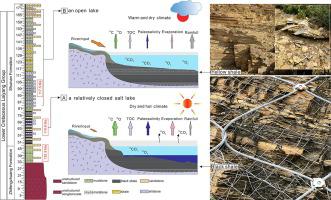当前位置:
X-MOL 学术
›
J. Asian Earth Sci.
›
论文详情
Our official English website, www.x-mol.net, welcomes your
feedback! (Note: you will need to create a separate account there.)
A lacustrine record of the early Aptian climate change by oceanic anoxic event (OAE) 1a in the Jiaolai Basin, eastern China
Journal of Asian Earth Sciences ( IF 2.7 ) Pub Date : 2020-11-01 , DOI: 10.1016/j.jseaes.2020.104537 Xiangyu Zhang , Shoujun Li
Journal of Asian Earth Sciences ( IF 2.7 ) Pub Date : 2020-11-01 , DOI: 10.1016/j.jseaes.2020.104537 Xiangyu Zhang , Shoujun Li

|
Abstract The early Aptian climate change resulted in changes in both the ocean and terrestrial ecosystems. This global climate change is well documented in marine sediments in the form of the oceanic anoxic event (OAE) 1a, but it has rarely been reported from the inland lakes in the East Asian continent. In this study, carbon and oxygen isotopes, quantitative palaeosalinity, clay mineral composition and contents, organic matter content, and detrital zircon ages from the Shuinan and Zhifengzhuang Formations in the Jiaolai Basin were determined to examine whether this global climate change was recorded in inland lakes. This study showed that in the early depositional stage of the Shuinan Formation, the paleo-lake in the Jiaolai Basin was a saline lake with long detention and strong sealing. The climate of the Jiaolai Basin became hotter and drier in the early Aptian (~120 Ma) and the evaporation increased, which increased the palaeosalinity of the Shuinan Formation. High-salinity water, high temperatures, and strong evaporation led to a positive migration of the δ13C values. The extreme dry and hot climate documented in the black shale of the Shuinan Formation might serve as a response of inland lakes to OAE 1a. This study provided not only a lacustrine record of an Early Aptian global climate change event but also a new perspective to deepen the understanding of the effects of the Cretaceous climate change in terrestrial ecosystems.
更新日期:2020-11-01











































 京公网安备 11010802027423号
京公网安备 11010802027423号